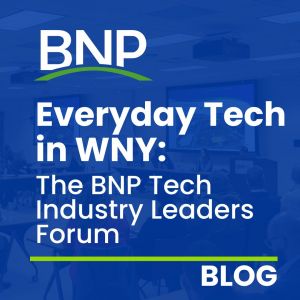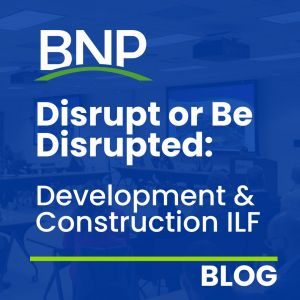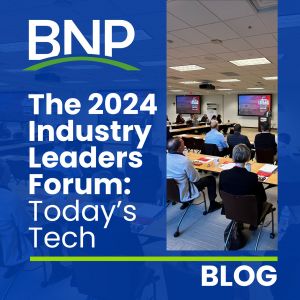Top Labor Issues for New York Employers
Blog Categories
February 5, 2024
By: Ibrahim Tariq | Partner, Harris Beach PLLC
Harris Beach PLLC is a presenting sponsor of the BNP Industry Leaders Forum, convening regional business leaders with their peers to strategize for the future success of their industry and the overall economic vitality of the regional economy.
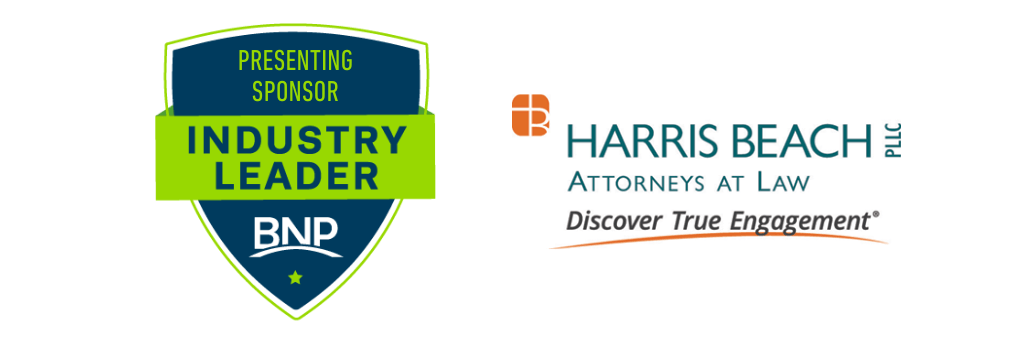
As we look ahead with excitement to a new year, business leaders throughout the Buffalo region are faced with a very 2023 problem: finding skilled workers to ensure the success of their businesses.
The region’s transformation from decaying industrial hub to a revived, diverse, technology-driven landscape invested in sectors such as healthcare, advanced manufacturing, renewable energy and information technology has been nothing short of remarkable. But maintaining momentum depends on skilled workers, the dearth of which is a problem that actually stretches back much further than 2023 and seems destined to challenge the regional economy well into the future.
While we’re fortunate to benefit from the Buffalo Niagara Partnership’s focused advocacy, education and training efforts in pursuit of regional prosperity, no single entity can solve the diverse workforce needs of our region, state and nation. While programs such as the BNP’s Talent Pipeline Management attempt to meet workforce needs in manufacturing, customer service, commercial driving, health care and other industries, those workforce needs are so great, along with those in other professions and industries, they demand a systemic, multi-pronged, multi-year approach.
But, in the here and now, there is much work to be done. Harris Beach is proud to represent employers throughout the region and state with their present-day workforce challenges. Over the past year, several new regulations and laws have emerged, and Harris Beach has used its extensive experience to help employers navigate new landscapes.
We tackled some of those as part of our annual Labor and Employment webinar series. As we turn the page on 2023, here are some labor issues for employers to be aware of – in addition to the dearth of skilled workers -- now and in the future:
Employee social media
- What’s new: Effective March 12, 2024, employers are prohibited from requesting or requiring an employee’s or job applicant’s social media or “personal account” information (user names, passwords, login information) as a condition of hiring, employment status or for use in disciplinary actions.
- Important to know: The law will not prevent employers from viewing or accessing information about an employee or job applicant that is publicly available without login information. Employers will be permitted to view social media posts, including photographs, videos, or messages, that an employee, client, or third party voluntarily shares with an employer for purposes of reporting misconduct. Employers should remain mindful, however, of inadvertent missteps as a result of viewing employees’ social media accounts, given existing protections covering employees’ “lawful” activities on off-duty hours.
- Action to take: Consider revising policies, hiring documents and job applications that request social media usernames or put in a disclaimer.
New York State’s Pay Transparency Law
- What’s new: The New York State Pay Transparency Law went into effect on Sept. 17, 2023, following the New York City Pay Transparency Law that took effect in November 2022. The state law requires employers with four or more employees to disclose the minimum and maximum annual salary or hourly wage in job postings. The law applies to postings that advertise a job, promotion, or transfer opportunity to a pool of potential applicants, both internally and externally, and includes electronic job postings. The requirements apply to postings for jobs that will physically be performed in New York State or by workers outside the state who report to an office or supervisor in New York.
- Important to know: The law has the potential to cover job postings for purely “remote” jobs, even if the applicant is situated outside of New York state and might never be required to enter New York state. If a job applicant would eventually be managed by a supervisor or office situated in New York, employers would be well-advised to structure the job posting in accordance with the new law.
- Action to take: Employers must include the pertinent information in relevant job postings.
Expansion of New York Paid Family Leave
- New Law: As of Jan.1, 2023, New York’s Paid Family Leave (PFL) Law was amended to expand the definition of a “family member” for whom an employee may take leave to care for. Prior to the law being amended, “family member” included an employee’s spouse, domestic partner (including the same and different gender couples; legal registration not required), child/stepchild and anyone for whom the employee has legal custody, parents/stepparents, parent-in-law, grandparent and grandchild. Following the amendment, “family member” also includes a “sibling” which is defined to mean a biological or adopted sibling, a half-sibling, or a stepsibling.
- Important to know: If an employer were to employ siblings, then only the individual caring for their sibling’s serious health condition would qualify for NYPFL. The sibling with the serious health condition may not take Paid Family leave to care for their own serious health condition.
- Action to take: Employers should rewrite policies to comply with the law. Further, employers covered by the federal Family & Medical Leave Act (“FMLA”) should take care to ensure their policies properly designate protected medical leave under either law, as New York’s Paid Family Leave Law offers a broader definition of “family member” than the FMLA.
Lactation Accommodation Policy
- What’s new: Effective June 7, 2023, New York employers are required to comply with new obligations under recent amendments to New York Labor Law § 206-c, including the provision of a designated pumping location and the adoption of a lactation policy. The New York Department of Labor published a model policy that employers may use to satisfy the minimum requirements of Section 206-c for the purposes of implementing a lactation policy. Employers must either adopt the model policy or prepare one that meets or exceeds the requirements stated therein.
- Important to know: Employers are required to provide employees with a private room or other location close to the employees’ work area where they can pump breast milk. If the employer can’t provide a dedicated lactation room, a temporarily vacant room may be used instead. As a last resort, a cubicle can be used, but it must be fully enclosed with walls at least seven feet tall. New York state’s expanded requirements track with the increased focus on lactation accommodations nationwide. The New York State requirements echo much of the lactation accommodation requirements already in effect under New York City law.
- Action to take: This is a good time for employers to assess their lactation rooms and accommodations. Employers should also update their employee handbook policies on employee lactation rights and consider engaging their workplace counsel to craft a more bespoke policy than the Department of Labor’s model version.
Notice of Unemployment Benefits
- What’s new: This law, which took effect Nov. 13, 2023, requires employers to provide employees with written notice of the right to file for unemployment benefits when the employee experiences total or partial unemployment, or has their hours reduced. Such notification will be required “at the time of each permanent or indefinite separation from employment, reduction in hours, temporary separation, [or] any other interruption of continued employment that results in total or partial unemployment.
- Important to know: The notice must be provided no more than five working days after the termination date or reduction of their working hours. In the same five-working-day period, Section 195(6) of the Labor Law still requires an employer to "notify any employee terminated from employment, in writing, of the exact date of such termination, as well as the exact date of cancellation of employee benefits connected with such termination."
- Action to take: While many employers already provided unemployment notices upon separation of employment, the updated law imposes similar obligations when employees experience a reduction in work hours — such as a furlough or other extended temporary leave.
New York Law Seeking Ban on Non-compete Agreements
- What’s new: On June 20, 2023, the New York State Senate and New York State Assembly approved a bill that would have amended the N.Y. Labor Law and prohibit non-compete agreements. The bill read “For all covered individuals, no employer…corporation, partnership, limited liability company, or other entity, shall seek require, demand or accept a non-compete agreement from any covered individual.” “Covered individual” is anyone preforming work or services for another (i.e., employees and potentially independent contractors). The bill defines “non-compete agreement,” as “any agreement, or clause contained in any agreement, between an employer and a covered individual that prohibits or restricts such covered individual from obtaining employment, after the conclusion of employment with the employer included as a party to the agreement.”
- Important to know: The bill additionally would have provided “covered individuals” with a private cause of action against an employer alleged to have violated the terms of the legislation, providing a two-year statute of limitation for such claims, starting from the later of when the agreement was signed; when the “covered individual” learns about the noncompete agreement; when the agreement or employment relationship is terminated; or when the employer attempts to enforce a noncompete agreement.
- Action to take: The bill was vetoed by Gov. Kathy Hochul. She proclaimed it too broad and wanted it more focused on lower-wage workers. A revised bill is expected to be reintroduced next session.
New York Model Sexual Harassment Prevention Policy
- What’s new: On April 11, 2023, the New York State Department of Labor (NYSDOL) finalized updates to the state’s “Sexual Harassment Model Policy.” Those revisions included additional examples of sexual harassment, discrimination, and retaliation that illustrate how issues can occur even with employees working remotely and on virtual platforms. The revisions further emphasized that gender-based harassment and discrimination can include conduct beyond sexual contact or sexually suggestive conduct, including stereotyping or treating employees differently because they identify as cisgender, transgender, or nonbinary.
- Important to know: Employers adopting the model policy should be mindful of the model policy’s language on harassment on the basis of other protected characteristics beyond sex and gender. Further, the new model policy defines gender identity; provides examples of actions bystanders can take; clarifies that harassment does not have to be "severe or pervasive" and need only rise above the level of a "petty slight" or "trivial inconvenience" to be unlawful; and emphasizes it is the impact of the behavior, not the intent, that matters in determining whether conduct violates the policy.
- Action to take: Employers in New York State are required to either implement written sexual harassment prevention policies that meet or exceed the minimum standards set forth in Section 201-g of the New York Labor Law or adopt the model policy published by the NYDOL. Employers should either adopt the model policy or draft one that meets the minimum requirements of NYLL, and as with the updates to policies on lactation rights, consider engaging their workplace counsel to craft a policy that best meets their particular needs.
Increased Minimum Salary Threshold for Certain Exemptions Under New York Labor Law
- What’s new: Taking effect March 13, 2024, this amended law increases the salary threshold for certain exemptions under Article 6 of the New York Labor Law (NYLL) from $900 per week to $1,300 per week. Article 6 is often referred to as the “Payment of Wages” provision. The exemptions cover modifications to employer’s requirements on frequency-of-pay, mandatory payroll deductions, and timing of final paychecks. Notably: this updated threshold is distinct from a different threshold for exemptions from overtime pay, discussed below.
- Important to know: In a statutory anomaly, the increased salary thresholds do not relate to the determination of exempt status with respect to the NYLL’s minimum wage and overtime obligations (discussed below).
- Action to take: Employers should review if segments of their workforce are no longer “exempt” from certain payment-of-wages rules. Inadvertent noncompliance on these issues — most notably frequency-of-pay rules — trigger severe penalties and make easy fodder for class action claims.
Minimum Wage Increasing
- What’s new: Minimum wage is increasing over the next few years. For New York state, the wage increases to $15 in 2024, $15.50 to 2025 and $16 in 2026.
- Important to know: For New York City, Westchester and Long Island, the increases are $16 in 2024, $16.50 in 2025 and $17 in 2026.
- Action to take: Employers must take steps to compensate employees according to the new wage minimums.
Salary Levels for Overtime Exemptions Changing
What’s new: Effective January 1, there are new minimum salary thresholds for overtime exemption for “executive” and “administrative” employees. This comes from an annual regulation update by the NY Department of Labor.
These are the minimum salary thresholds:
- NYC and “Downstate” (Nassau County, Suffolk County, Westchester County): $1,200 per week
- Rest of state: $1,124.20 per week
These thresholds will increase again in 2025 and 2026.
- NYC and Downstate: $1237.50 per week in 2025; $1,275 in 2026
- Rest of state: $1,161.65 in 2025; $1,199.10 in 2026.
Important to know: For comparison, the thresholds in 2023 were:
- NYC and Downstate: $1,125 per week ($58,500 annually)
- Rest of state: $1,064.25 ($55,341 annually)
Action to take: Employers with exempt executives or administrative employees who have salaries hovering around the $55,000 to $58,000 range in annual salary should be assessed and Employers must take steps to compensate employees according to the new wage minimums.
Assigning Employee Inventions
- What’s new: New York’s recent addition of Section 203-f to Labor Law declares unenforceable any provisions in existing and future employment agreements requiring an employee to assign to the employer those inventions developed entirely on the employee’s own time without using the employer’s equipment, supplies, facilities or trade secrets. The new law is rooted in public policy to strengthen IP protections for workers, encourage innovation, and grow the New York tech sector. The new law does not apply to inventions that “relate to” the employer’s business or “result from” work performed for the employer, but the legislature recognized that “overly broad contracts can rob employees of their intellectual property.” As a result, certain inventions made while under an employment contract are non-assignable by the employment contract.
- Important to know: The intent is to catch up to jurisdictions such as California, where similar protections already exist. Additional jurisdictions which limit employer-required assignments include Delaware, Illinois, Kansas, Minnesota, Nevada, New Jersey, North Carolina, Utah, and Washington.
- Action to take: Employers should review their employment agreements for compliance with assignment limitations and ensure there is a severability clause in existing agreements to preserve their enforceability.
“Captive audience meetings”
- What’s new: A new law prohibiting so-called “captive audience meetings” employers hold to educate employees about the cons of union organizing. The stated reason for the law is to prohibit employers from disciplining employees who opt out of employer-sponsored meetings or other communications with a primary purpose of communicating the “employer’s opinion on religious or political matters.” The bill defines political matters as those “relating to elections for political office, political parties, legislation, regulation and the decision to join or support any political party or political, civic, community, fraternal or labor organization.” It defines religious matters as those “relating to religious affiliation and practice and the decision to join or support any religious organization or association.”
- Important to know: Beyond its stated cause, this law is designed to keep employers from educating employees about the cons or union organizing. Employers facing union organizing activities should consult an attorney before initiating education campaigns.
- Action to take: Many expect the law to be challenged. A similar law in Connecticut is being challenged by a coalition led by the U.S. Chamber of Commerce. The group filed a lawsuit in U.S. District Court in Hartford, arguing the law is unconstitutional. A similar Wisconsin law did not survive a 2010 legal challenge.
These are just some of the new laws, regulations and policies employers should be aware of going into the new year. If you need help navigating the labor and employment landscape, Harris Beach is here to help. With offices across the state, including here in Buffalo, our attorneys constantly monitor and analyze the labor environment. Please reach out to attorney Robert G. Murray at (716) 200-5180 and bmurray@harrisbeach.com.
Title Sponsor

Presenting Sponsors

Supporting Sponsors
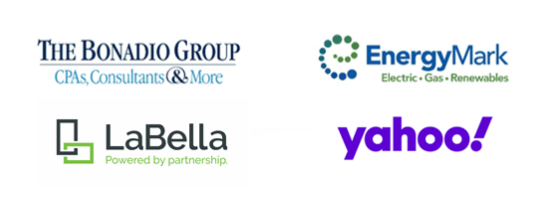
Related Posts
Everyday Tech in WNY: The BNP Tech Industry Leaders Forum
Decision makers from both tech, and tech enabled companies, came together on March 14th at the Tech Industry Leaders Forum (ILF) for a conversation on Everyday Tech: Cyber Security and AI Across All Industries.
From Before the First Click: The BNP Hospitality & Tourism Industry Leaders Forum
At our Hospitality & Tourism Industry Leaders Forum, an impressive group of experts provided insights on how digital innovations are shaping the guest experience well before they even book their trip or make reservations.
Disrupt or Be Disrupted: The BNP Development & Construction Industry Leaders Forum
Over 100 attendees came together at the January 25th Development & Construction Industry Leaders Forum, kicking off the 2024 ILF schedule, to discuss the importance of making construction tech a priority in Western New York.
The 2024 Industry Leaders Forum: Today’s Tech
Buffalo Niagara Partnership is launching the second year of the Industry Leaders Forum (ILF) building off of a successful inaugural 2023 program. As always, ILF’s goal is to provide a space for BNP members to strategize for the future success of their business, industry, and the overall economic vitality of Western New York.

